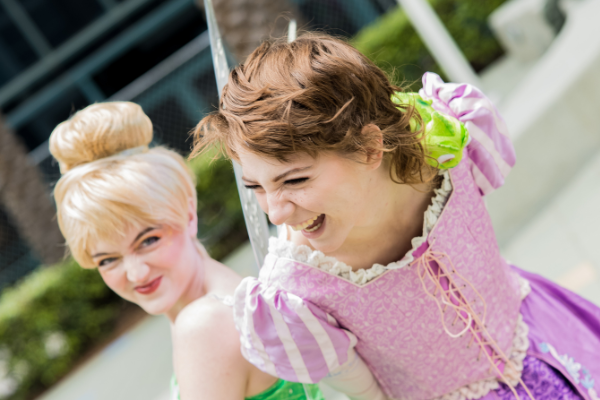During weekdays, Allison Byer sports a short blondish shag, rounded-glasses that tint her blue eyes, and 80s-inspired fashion. But on weekends, with the help of waist-length wigs and princess gowns, Byer transforms into a vision straight from a Disney movie.
For the past five years, Byer, 19, has worked independently and for different entertainment companies, making $50 to $100 an hour as a party princess in Los Angeles County. She reads books to children, paints their faces, and plays freeze-dance while dressed as Elsa from Frozen.
Though Byer says her job has perks, working such a demanding job at a young age was taxing on an emotional level. The pandemic offered Byer a forced break from her princess personas, allowing her to see how the job affected her.
“It felt like I was performing all the time,” Byer said. “I was doing it in years where you’re kind of figuring out your identity, as a young teenager…trying to figure out who you are. But I was being somebody else half of my time.”
In June 2020, Byer came out publicly as a lesbian and chopped her hair off. Royal Entertainers, the company that Byer had been employed with for three years, slowly stopped booking her, though they never said the reason why.
Byer explained that as she began to feel more comfortable in her queer identity, it was conflicting to get an influx of positive reinforcement—in money and attention—from being dressed as an ultra-feminine princess.
Pressure to perform continued outside of work as Byer, who had over 10 thousand followers on Instagram, used the page to book clients and keep sponsors satisfied. Though Byer may want a tattoo or piercing, she explained that Princess Ariel can’t show up with one, so neither can she.
“I couldn’t be who I really was because I was being paid to be somebody I wasn’t,” Byer said.
The break from COVID-19 allowed Byer to separate her identity and her work. In taking time to better know herself, Byer says she has found the beauty in the duality of the work she does. Now she is able to appreciate the responsibility that comes with the crown.
The kids fall in love and open up to her instantly, talking her ear off and showing her their rooms. Sometimes, they just want to be held. Byer’s work uniform, which happens to be a glittery princess dress, acts as an enchanted bridge that emotionally connect children to her.
“The kids seeing Elsa—like their hero—is really cool to be that,” Byer said. “Because it’s like, I am not, but I am. Like, I created this for you and you believe me. I think that idea of belief is really cool for kids. They get to have faith in something.”


